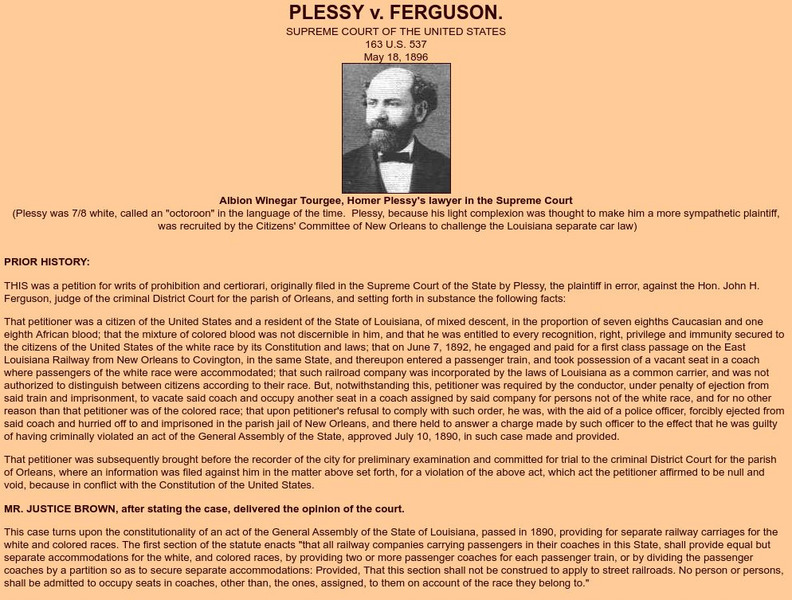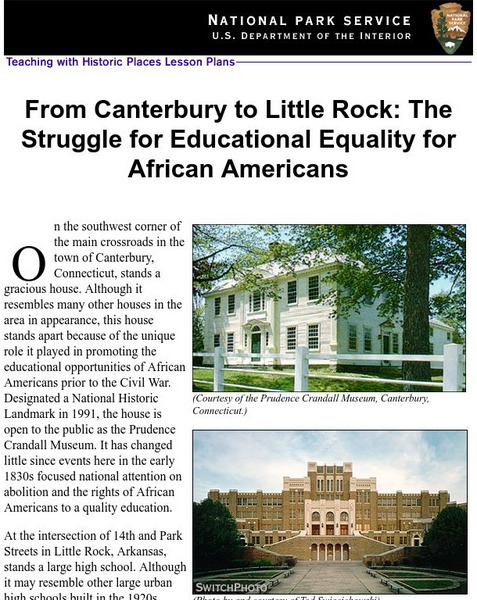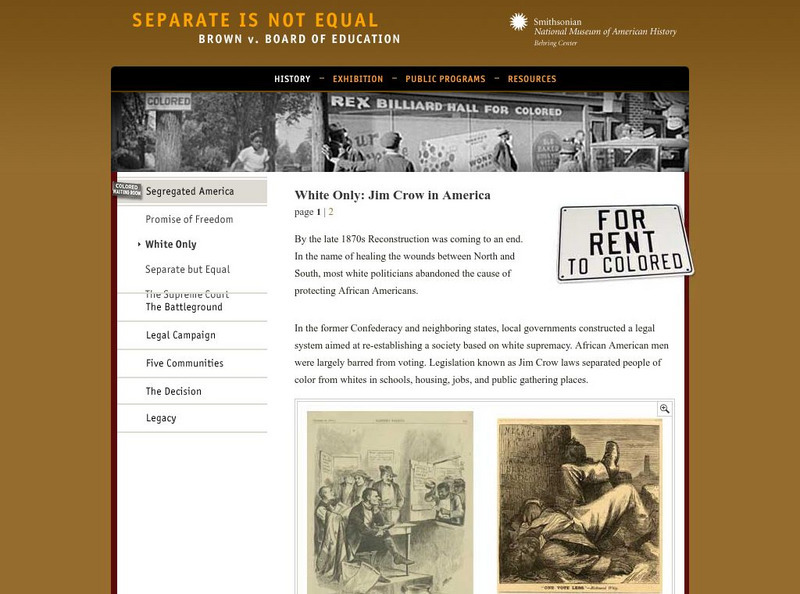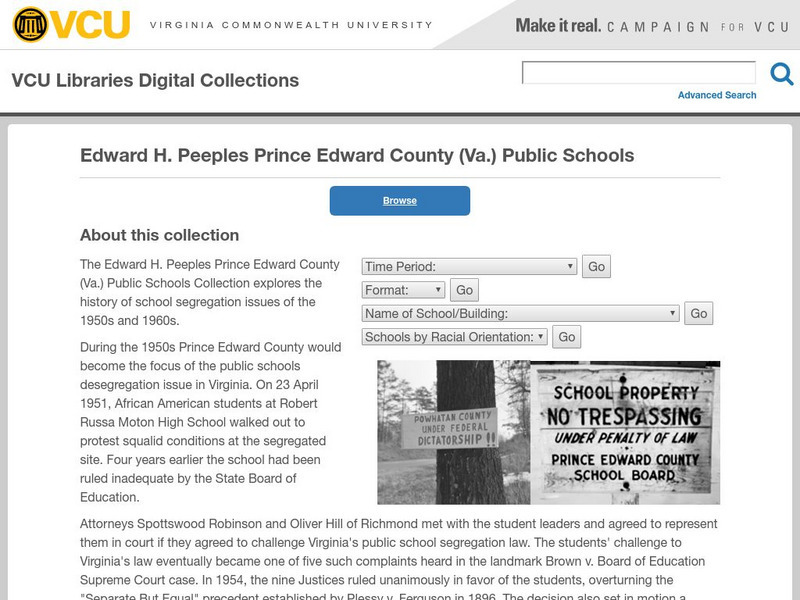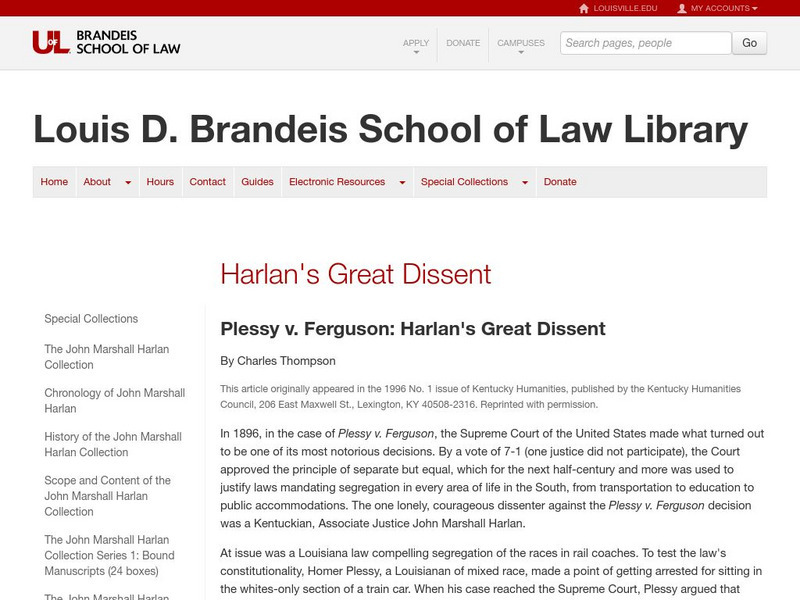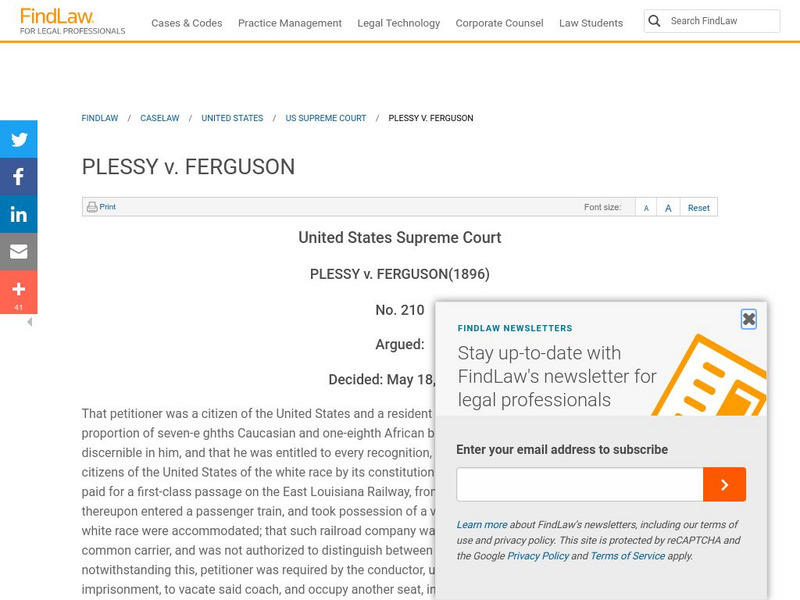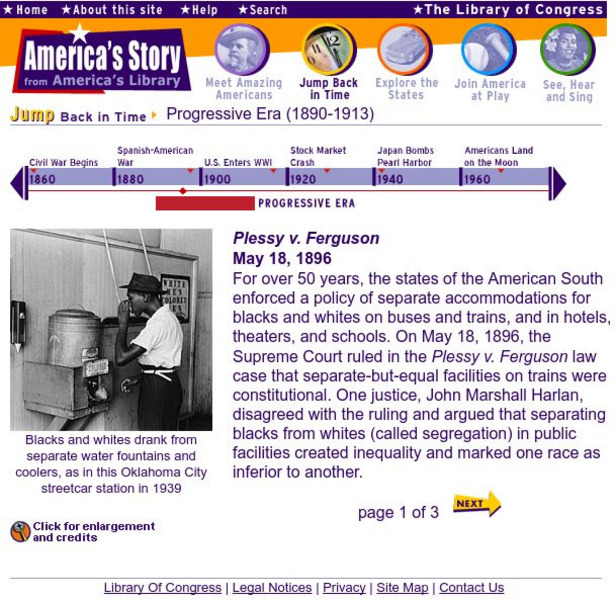ClassFlow
Class Flow: Separate but Equal
[Free Registration/Login Required] Using a thorough Glossary of Terms, students discuss the idea of being separate but equal.
Independence Hall Association
U.s. History: Separate No Longer?
An explantion of how the Supreme Court decision in Brown v Board of Education of Topeka turned the concept of separate but equal on its head. See how they determined that the 14th Amendment was being violated when schools did not fund...
Digital History
Digital History: Equality Postponed [Pdf]
Read the background of the controversial Supreme Court decision in the Plessy v Ferguson case. Follow the arguments for and against "separate but equal." [pdf]
Other
In Pursuit of Freedom & Equality: Brown v. Board of Education of Topeka
Teachers and students can find a comprehensive summary of the Brown v. Board of Education of Topeka case. Learn about the myths and find out the truth. The activities offered are especially meaningful. Students can perform a...
University of Missouri
Exploring Constitutional Conflicts: Plessy v Ferguson
Read the Supreme Court opinion that solidified the concept of separate, but equal in American law. The dissenting opinion written by Justice John Harlan is also included.
US National Archives
Docsteach: From Dred Scott to Civil Rights Act of 1875: Eighteen Years of Change
In 1857, the U.S. Supreme Court ruled in the Dred Scott decision that African-Americans were not citizens of the United States. Yet within 18 years, Black Americans would not only have citizenship, but would be guaranteed the right to...
NBC
Nbc Learn: 1954: Separate Is Not Equal
In this video/lesson series we will explore a watershed moment in the Civil Rights movement that came in the Brown v. Board of Education decision. The Supreme Court rules unanimously that, "separate educational facilities are inherently...
Curated OER
National Park Service: The Struggle for Education Equality for African American
"Canterbury, Connecticut, and Little Rock, Arkansas, are links in a chain of events representing the long struggle for equal educational opportunities for African Americans. This lesson plan highlights two important historic places and...
Smithsonian Institution
National Museum of American History: Separate Is Not Equal: White Only
This section from the Smithsonian Institution's National Museum of American History's exhibition Separate Is Not Equal: Brown v. Board of Education gives the history of Jim Crow laws and how they affected not only the voting rights of...
Smithsonian Institution
National Museum of American History: Separate Is Not Equal: Brown v. Board of Education
From the Smithsonian Institution's National Museum of American History, this exhibition on Brown v. Board of Education shows much of the struggle of the Civil Rights era, not only to achieve equality in educational opportunities but to...
Virginia Commonwealth University
Virginia Commonwealth University: Separate but Not Equal
Telling pictures of elementary schools for Blacks and Whites during the 50s and 60s. Discusses the situation in Prince Edward County that led to the Davis v. County School Board of Prince Edward County court case.
Other
Louis D. Brandeis School of Law: Harlan's Great Dissent
An article from the University of Louisville about Justice John Harlan, who courageously cast the sole dissenting vote in the Plessy vs. Ferguson case, which approved of the principles of separate but equal.
Digital History
Digital History: Plessy v. Ferguson
A very thorough explanation of the famous Supreme Court decision about Plessy v. Ferguson. It upheld the idea of "separate but equal," which was in effect until Brown v Board of Education in 1954. See who opposed the decision, and read...
iCivics
I Civics: Plessy v. Ferguson (1896)
This mini-lesson covers the basics of the Supreme Court's decision that it was constitutional to keep black and white people segregated as long as the accommodations for each race were "equal." Students learn about the concept of...
iCivics
I Civics: Brown v. Board of Education (1954)
This mini-lesson covers the basics of the Supreme Court's decision that overturned "separate but equal" in public schools. Students learn about segregation and "equality under the law," and they use what they learned to craft compound...
Thomson Reuters
Find Law: u.s. Supreme Court: Plessy vs. Ferguson
Transcript of the infamous Supreme Court decision that established the constitutionality of the principle of "Separate but equal," public facilities for members of different races. This was eventually overturned by the 1954 and 1955...
PBS
Pbs Learning Media: Documenting Brown: Plessy v. Ferguson
The Supreme Court's 1896 ruling legalized the "separate but equal" doctrine that sanctioned segregation.
Scholastic
Scholastic: Separate but Equal? An Experiment Mixes Urban and Suburban Students
Life is very different for students in urban and rural communities. Find out how these differences impact their everyday lives and experiences in the classroom.
NBC
Nbc Learn: Free Resources: Finishing the Dream: Learning From Civil Rights Era
Over one hundred video clips, culled from NBS News archives, document events and issues of the civil rights era, from 1954-68. Also includes contemporary perspectives on civil rights, with videos of town hall-style conversations about...
Illinois Institute of Technology
Oyez Project: Plessy v. Ferguson (1896)
The U.S. Supreme Court case that upheld the famous "separate but equal" doctrine by dealing with the issues of racial discrimination and equal protection. This resource provides an abstract containing a concise summary and a link to the...
PBS
Pbs Teachers: 1963 March on Washington and Its Impact (Lesson Plan)
A lesson plan that examines the events and conditions that led to the 1963 March on Washington and the impact of the march on civil rights in the United States. Learners learn about the concept of "separate but equal" and the philosophy...
Smithsonian Institution
National Museum of American History: Separate Is Not Equal: The Quest for Education
Part of a larger piece on Segregated America, this section focus is on the commitment and perseverance of African Americans in the post-Civil War South to overcome the obstacles standing in the way of an education. Offers teachers and...
Library of Congress
Loc: America's Story: Plessy v. Ferguson
The decision of the Supreme Court in Plessy v. Ferguson kept black and white people separate in all public areas for many years. To find out what that meant, and to see some actual photographs, visit this page.
Digital History
Digital History: The Supreme Court Orders Desegregation [Pdf]
This site is from a unit called 'African-Americans in the Land of Equality.' It looks at the 1954 decision by the Supreme Court in the Brown v. Board of Education case that ended school segregation.
Other popular searches
- Separate but Equal Movie
- Separate but Equal Video
- Separate but Equal History
- Separate but Equal Revisited




![Digital History: Equality Postponed [Pdf] Website Digital History: Equality Postponed [Pdf] Website](https://d15y2dacu3jp90.cloudfront.net/images/attachment_defaults/resource/large/FPO-knovation.png)

